Impact of Small Business on Economy
VerifiedAdded on 2020/10/22
|16
|4823
|230
AI Summary
This assignment provides a comprehensive analysis of the impact of small businesses on the UK economy. It includes various sources from academic journals and online resources that discuss the role of small businesses in contributing to local economic growth, job creation, and innovation. The assignment also highlights the importance of small businesses in supporting entrepreneurship and entrepreneurship education, as well as their contribution to social responsibility and business ethics.
Contribute Materials
Your contribution can guide someone’s learning journey. Share your
documents today.
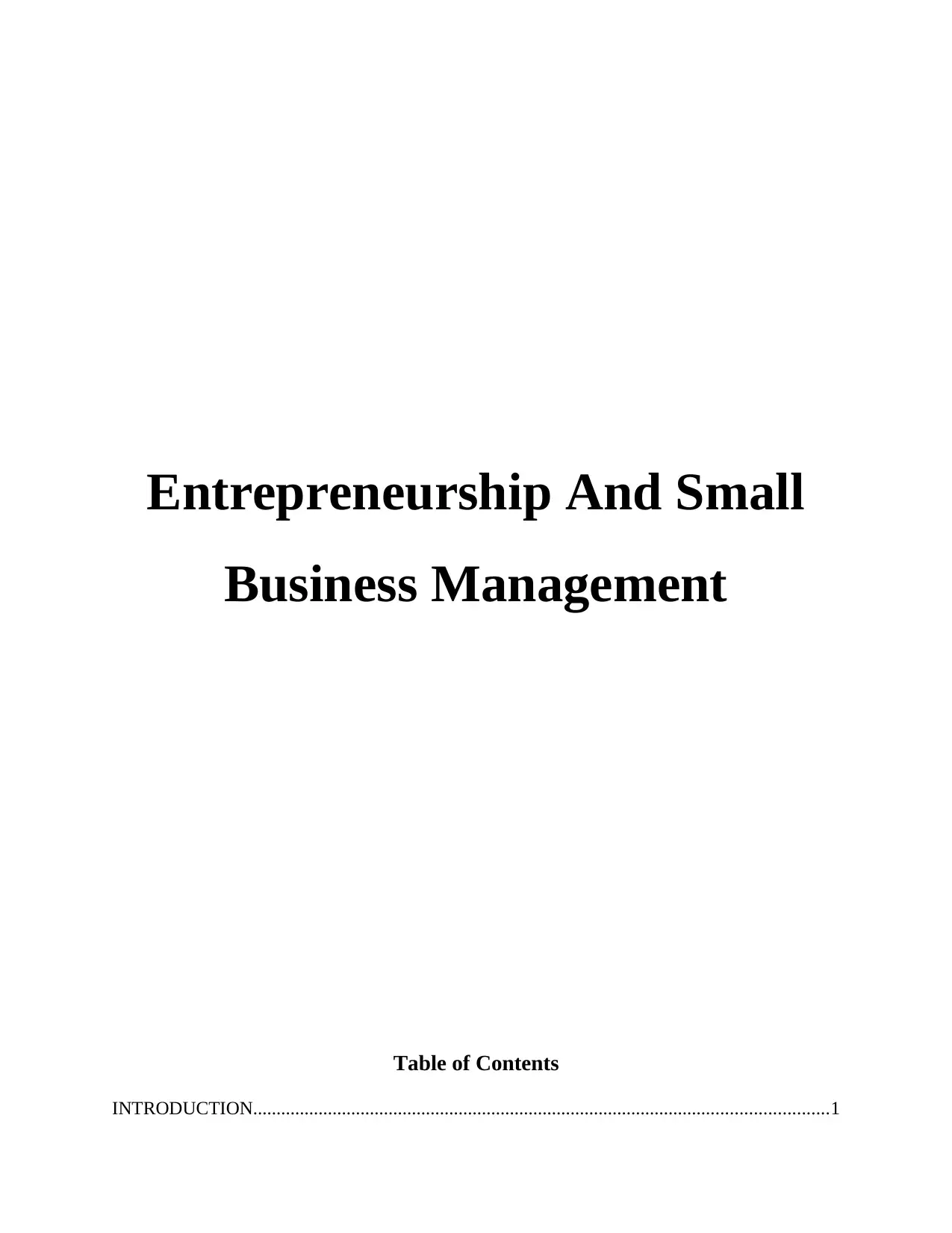
Entrepreneurship And Small
Business Management
Table of Contents
INTRODUCTION...........................................................................................................................1
Business Management
Table of Contents
INTRODUCTION...........................................................................................................................1
Secure Best Marks with AI Grader
Need help grading? Try our AI Grader for instant feedback on your assignments.
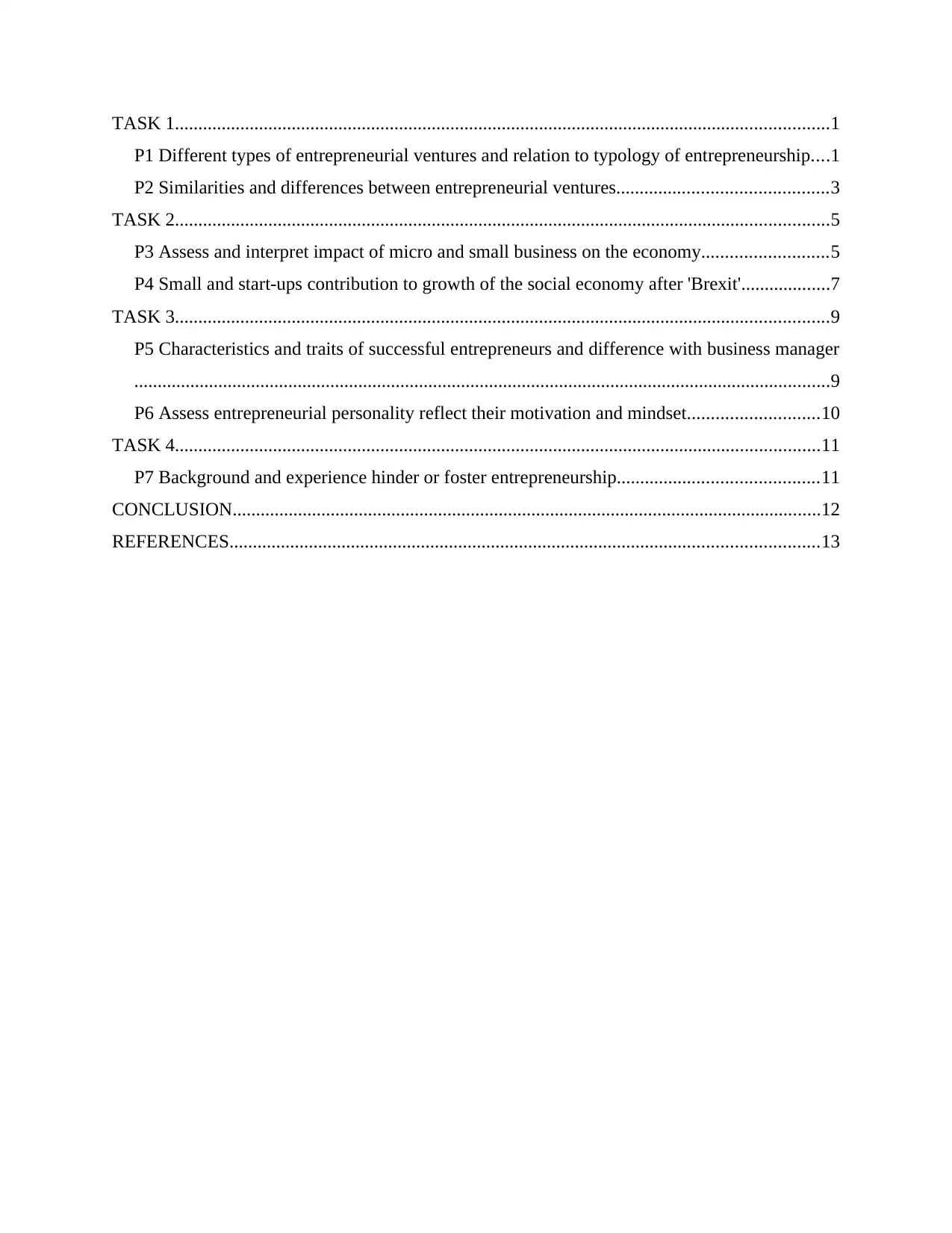
TASK 1............................................................................................................................................1
P1 Different types of entrepreneurial ventures and relation to typology of entrepreneurship....1
P2 Similarities and differences between entrepreneurial ventures.............................................3
TASK 2............................................................................................................................................5
P3 Assess and interpret impact of micro and small business on the economy...........................5
P4 Small and start-ups contribution to growth of the social economy after 'Brexit'...................7
TASK 3............................................................................................................................................9
P5 Characteristics and traits of successful entrepreneurs and difference with business manager
.....................................................................................................................................................9
P6 Assess entrepreneurial personality reflect their motivation and mindset............................10
TASK 4..........................................................................................................................................11
P7 Background and experience hinder or foster entrepreneurship...........................................11
CONCLUSION..............................................................................................................................12
REFERENCES..............................................................................................................................13
P1 Different types of entrepreneurial ventures and relation to typology of entrepreneurship....1
P2 Similarities and differences between entrepreneurial ventures.............................................3
TASK 2............................................................................................................................................5
P3 Assess and interpret impact of micro and small business on the economy...........................5
P4 Small and start-ups contribution to growth of the social economy after 'Brexit'...................7
TASK 3............................................................................................................................................9
P5 Characteristics and traits of successful entrepreneurs and difference with business manager
.....................................................................................................................................................9
P6 Assess entrepreneurial personality reflect their motivation and mindset............................10
TASK 4..........................................................................................................................................11
P7 Background and experience hinder or foster entrepreneurship...........................................11
CONCLUSION..............................................................................................................................12
REFERENCES..............................................................................................................................13
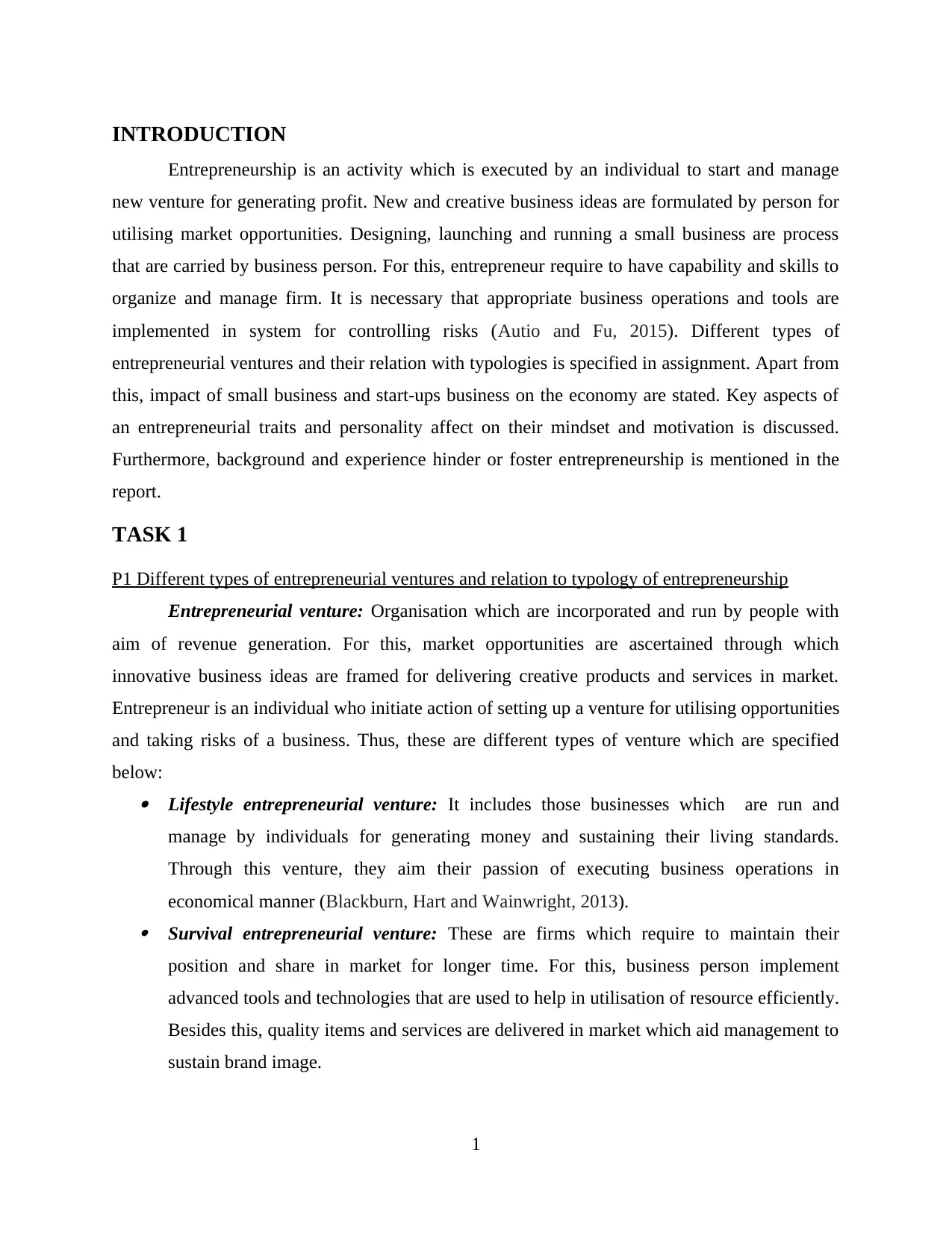
INTRODUCTION
Entrepreneurship is an activity which is executed by an individual to start and manage
new venture for generating profit. New and creative business ideas are formulated by person for
utilising market opportunities. Designing, launching and running a small business are process
that are carried by business person. For this, entrepreneur require to have capability and skills to
organize and manage firm. It is necessary that appropriate business operations and tools are
implemented in system for controlling risks (Autio and Fu, 2015). Different types of
entrepreneurial ventures and their relation with typologies is specified in assignment. Apart from
this, impact of small business and start-ups business on the economy are stated. Key aspects of
an entrepreneurial traits and personality affect on their mindset and motivation is discussed.
Furthermore, background and experience hinder or foster entrepreneurship is mentioned in the
report.
TASK 1
P1 Different types of entrepreneurial ventures and relation to typology of entrepreneurship
Entrepreneurial venture: Organisation which are incorporated and run by people with
aim of revenue generation. For this, market opportunities are ascertained through which
innovative business ideas are framed for delivering creative products and services in market.
Entrepreneur is an individual who initiate action of setting up a venture for utilising opportunities
and taking risks of a business. Thus, these are different types of venture which are specified
below: Lifestyle entrepreneurial venture: It includes those businesses which are run and
manage by individuals for generating money and sustaining their living standards.
Through this venture, they aim their passion of executing business operations in
economical manner (Blackburn, Hart and Wainwright, 2013). Survival entrepreneurial venture: These are firms which require to maintain their
position and share in market for longer time. For this, business person implement
advanced tools and technologies that are used to help in utilisation of resource efficiently.
Besides this, quality items and services are delivered in market which aid management to
sustain brand image.
1
Entrepreneurship is an activity which is executed by an individual to start and manage
new venture for generating profit. New and creative business ideas are formulated by person for
utilising market opportunities. Designing, launching and running a small business are process
that are carried by business person. For this, entrepreneur require to have capability and skills to
organize and manage firm. It is necessary that appropriate business operations and tools are
implemented in system for controlling risks (Autio and Fu, 2015). Different types of
entrepreneurial ventures and their relation with typologies is specified in assignment. Apart from
this, impact of small business and start-ups business on the economy are stated. Key aspects of
an entrepreneurial traits and personality affect on their mindset and motivation is discussed.
Furthermore, background and experience hinder or foster entrepreneurship is mentioned in the
report.
TASK 1
P1 Different types of entrepreneurial ventures and relation to typology of entrepreneurship
Entrepreneurial venture: Organisation which are incorporated and run by people with
aim of revenue generation. For this, market opportunities are ascertained through which
innovative business ideas are framed for delivering creative products and services in market.
Entrepreneur is an individual who initiate action of setting up a venture for utilising opportunities
and taking risks of a business. Thus, these are different types of venture which are specified
below: Lifestyle entrepreneurial venture: It includes those businesses which are run and
manage by individuals for generating money and sustaining their living standards.
Through this venture, they aim their passion of executing business operations in
economical manner (Blackburn, Hart and Wainwright, 2013). Survival entrepreneurial venture: These are firms which require to maintain their
position and share in market for longer time. For this, business person implement
advanced tools and technologies that are used to help in utilisation of resource efficiently.
Besides this, quality items and services are delivered in market which aid management to
sustain brand image.
1
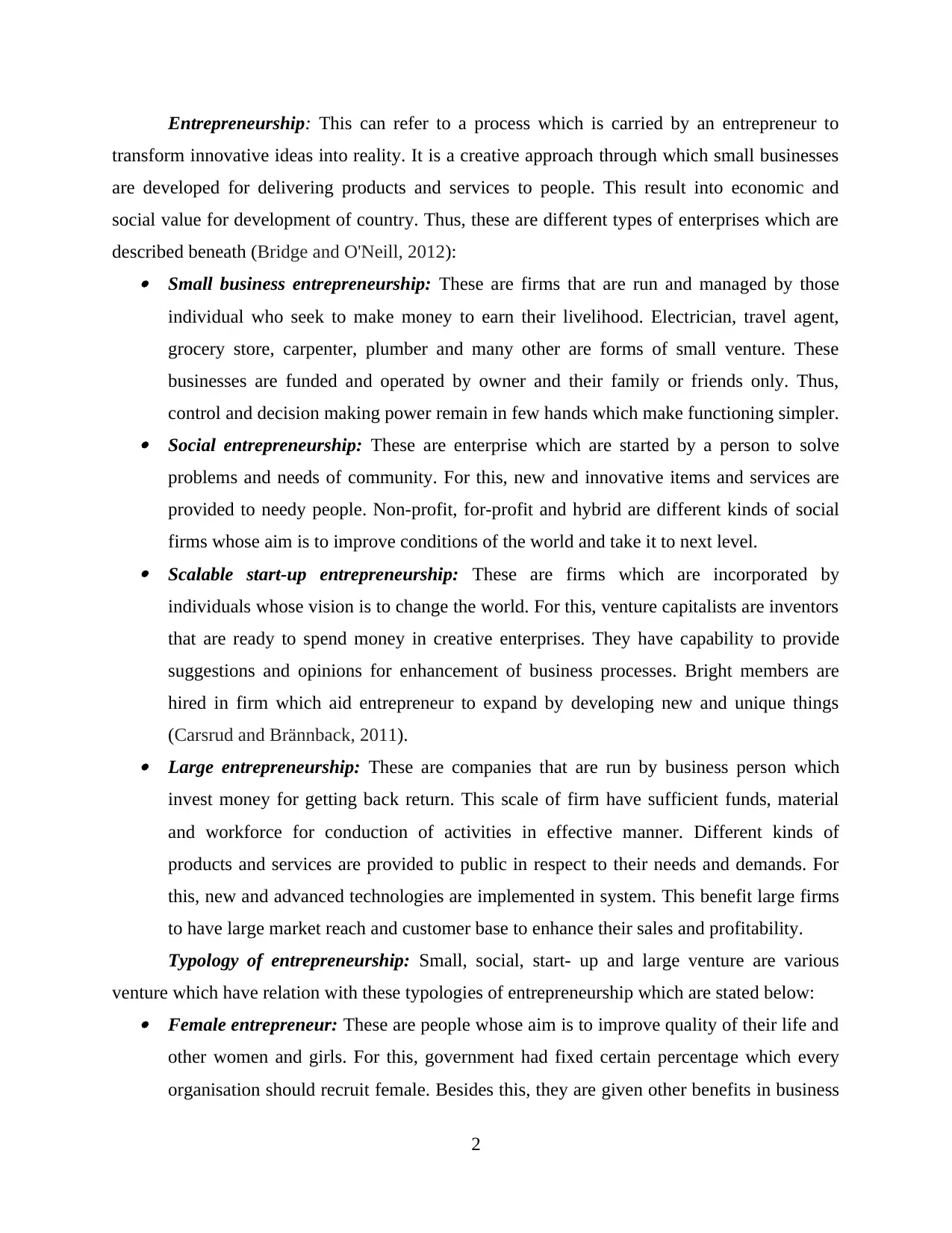
Entrepreneurship: This can refer to a process which is carried by an entrepreneur to
transform innovative ideas into reality. It is a creative approach through which small businesses
are developed for delivering products and services to people. This result into economic and
social value for development of country. Thus, these are different types of enterprises which are
described beneath (Bridge and O'Neill, 2012): Small business entrepreneurship: These are firms that are run and managed by those
individual who seek to make money to earn their livelihood. Electrician, travel agent,
grocery store, carpenter, plumber and many other are forms of small venture. These
businesses are funded and operated by owner and their family or friends only. Thus,
control and decision making power remain in few hands which make functioning simpler. Social entrepreneurship: These are enterprise which are started by a person to solve
problems and needs of community. For this, new and innovative items and services are
provided to needy people. Non-profit, for-profit and hybrid are different kinds of social
firms whose aim is to improve conditions of the world and take it to next level. Scalable start-up entrepreneurship: These are firms which are incorporated by
individuals whose vision is to change the world. For this, venture capitalists are inventors
that are ready to spend money in creative enterprises. They have capability to provide
suggestions and opinions for enhancement of business processes. Bright members are
hired in firm which aid entrepreneur to expand by developing new and unique things
(Carsrud and Brännback, 2011). Large entrepreneurship: These are companies that are run by business person which
invest money for getting back return. This scale of firm have sufficient funds, material
and workforce for conduction of activities in effective manner. Different kinds of
products and services are provided to public in respect to their needs and demands. For
this, new and advanced technologies are implemented in system. This benefit large firms
to have large market reach and customer base to enhance their sales and profitability.
Typology of entrepreneurship: Small, social, start- up and large venture are various
venture which have relation with these typologies of entrepreneurship which are stated below: Female entrepreneur: These are people whose aim is to improve quality of their life and
other women and girls. For this, government had fixed certain percentage which every
organisation should recruit female. Besides this, they are given other benefits in business
2
transform innovative ideas into reality. It is a creative approach through which small businesses
are developed for delivering products and services to people. This result into economic and
social value for development of country. Thus, these are different types of enterprises which are
described beneath (Bridge and O'Neill, 2012): Small business entrepreneurship: These are firms that are run and managed by those
individual who seek to make money to earn their livelihood. Electrician, travel agent,
grocery store, carpenter, plumber and many other are forms of small venture. These
businesses are funded and operated by owner and their family or friends only. Thus,
control and decision making power remain in few hands which make functioning simpler. Social entrepreneurship: These are enterprise which are started by a person to solve
problems and needs of community. For this, new and innovative items and services are
provided to needy people. Non-profit, for-profit and hybrid are different kinds of social
firms whose aim is to improve conditions of the world and take it to next level. Scalable start-up entrepreneurship: These are firms which are incorporated by
individuals whose vision is to change the world. For this, venture capitalists are inventors
that are ready to spend money in creative enterprises. They have capability to provide
suggestions and opinions for enhancement of business processes. Bright members are
hired in firm which aid entrepreneur to expand by developing new and unique things
(Carsrud and Brännback, 2011). Large entrepreneurship: These are companies that are run by business person which
invest money for getting back return. This scale of firm have sufficient funds, material
and workforce for conduction of activities in effective manner. Different kinds of
products and services are provided to public in respect to their needs and demands. For
this, new and advanced technologies are implemented in system. This benefit large firms
to have large market reach and customer base to enhance their sales and profitability.
Typology of entrepreneurship: Small, social, start- up and large venture are various
venture which have relation with these typologies of entrepreneurship which are stated below: Female entrepreneur: These are people whose aim is to improve quality of their life and
other women and girls. For this, government had fixed certain percentage which every
organisation should recruit female. Besides this, they are given other benefits in business
2
Secure Best Marks with AI Grader
Need help grading? Try our AI Grader for instant feedback on your assignments.
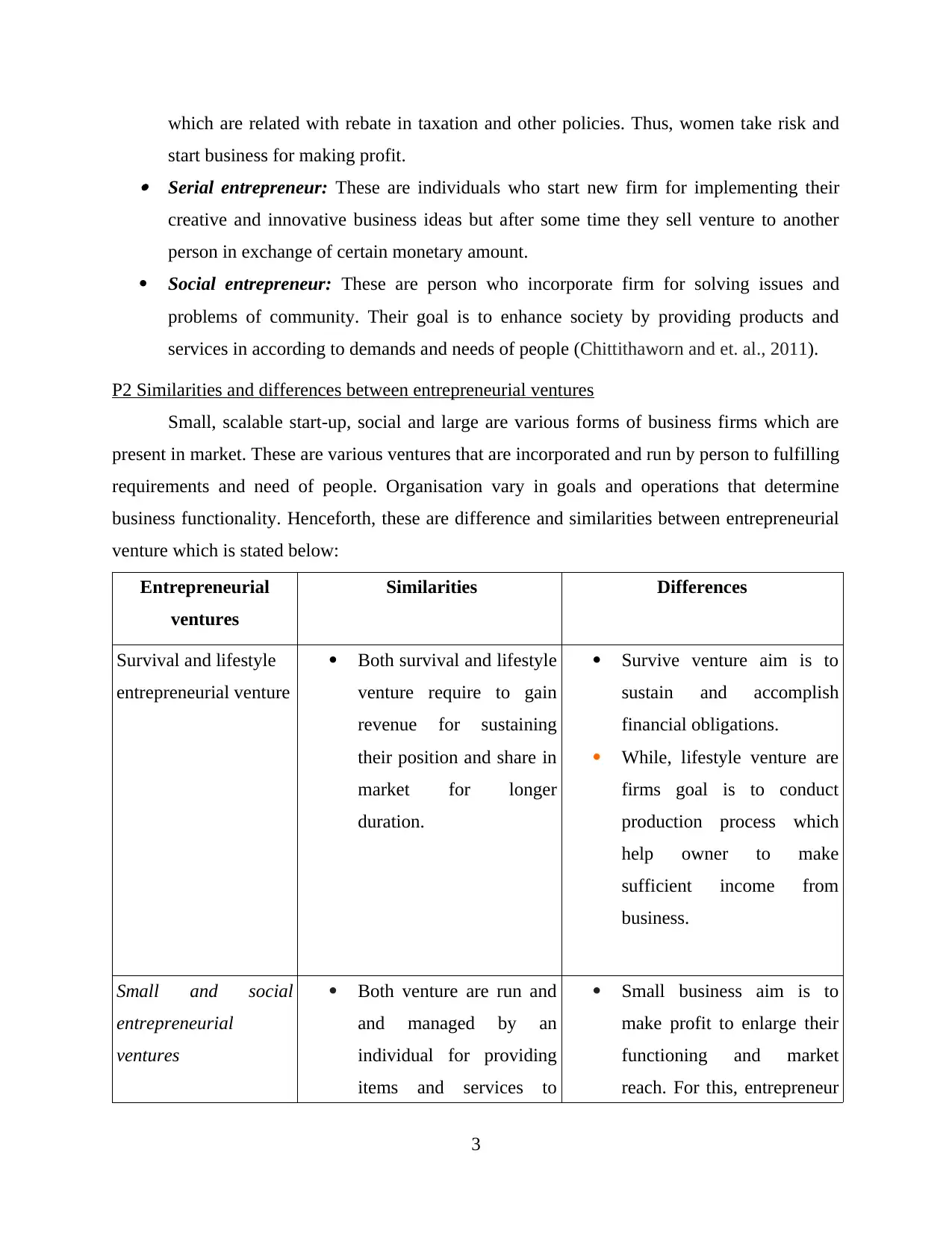
which are related with rebate in taxation and other policies. Thus, women take risk and
start business for making profit. Serial entrepreneur: These are individuals who start new firm for implementing their
creative and innovative business ideas but after some time they sell venture to another
person in exchange of certain monetary amount.
Social entrepreneur: These are person who incorporate firm for solving issues and
problems of community. Their goal is to enhance society by providing products and
services in according to demands and needs of people (Chittithaworn and et. al., 2011).
P2 Similarities and differences between entrepreneurial ventures
Small, scalable start-up, social and large are various forms of business firms which are
present in market. These are various ventures that are incorporated and run by person to fulfilling
requirements and need of people. Organisation vary in goals and operations that determine
business functionality. Henceforth, these are difference and similarities between entrepreneurial
venture which is stated below:
Entrepreneurial
ventures
Similarities Differences
Survival and lifestyle
entrepreneurial venture
Both survival and lifestyle
venture require to gain
revenue for sustaining
their position and share in
market for longer
duration.
Survive venture aim is to
sustain and accomplish
financial obligations.
While, lifestyle venture are
firms goal is to conduct
production process which
help owner to make
sufficient income from
business.
Small and social
entrepreneurial
ventures
Both venture are run and
and managed by an
individual for providing
items and services to
Small business aim is to
make profit to enlarge their
functioning and market
reach. For this, entrepreneur
3
start business for making profit. Serial entrepreneur: These are individuals who start new firm for implementing their
creative and innovative business ideas but after some time they sell venture to another
person in exchange of certain monetary amount.
Social entrepreneur: These are person who incorporate firm for solving issues and
problems of community. Their goal is to enhance society by providing products and
services in according to demands and needs of people (Chittithaworn and et. al., 2011).
P2 Similarities and differences between entrepreneurial ventures
Small, scalable start-up, social and large are various forms of business firms which are
present in market. These are various ventures that are incorporated and run by person to fulfilling
requirements and need of people. Organisation vary in goals and operations that determine
business functionality. Henceforth, these are difference and similarities between entrepreneurial
venture which is stated below:
Entrepreneurial
ventures
Similarities Differences
Survival and lifestyle
entrepreneurial venture
Both survival and lifestyle
venture require to gain
revenue for sustaining
their position and share in
market for longer
duration.
Survive venture aim is to
sustain and accomplish
financial obligations.
While, lifestyle venture are
firms goal is to conduct
production process which
help owner to make
sufficient income from
business.
Small and social
entrepreneurial
ventures
Both venture are run and
and managed by an
individual for providing
items and services to
Small business aim is to
make profit to enlarge their
functioning and market
reach. For this, entrepreneur
3
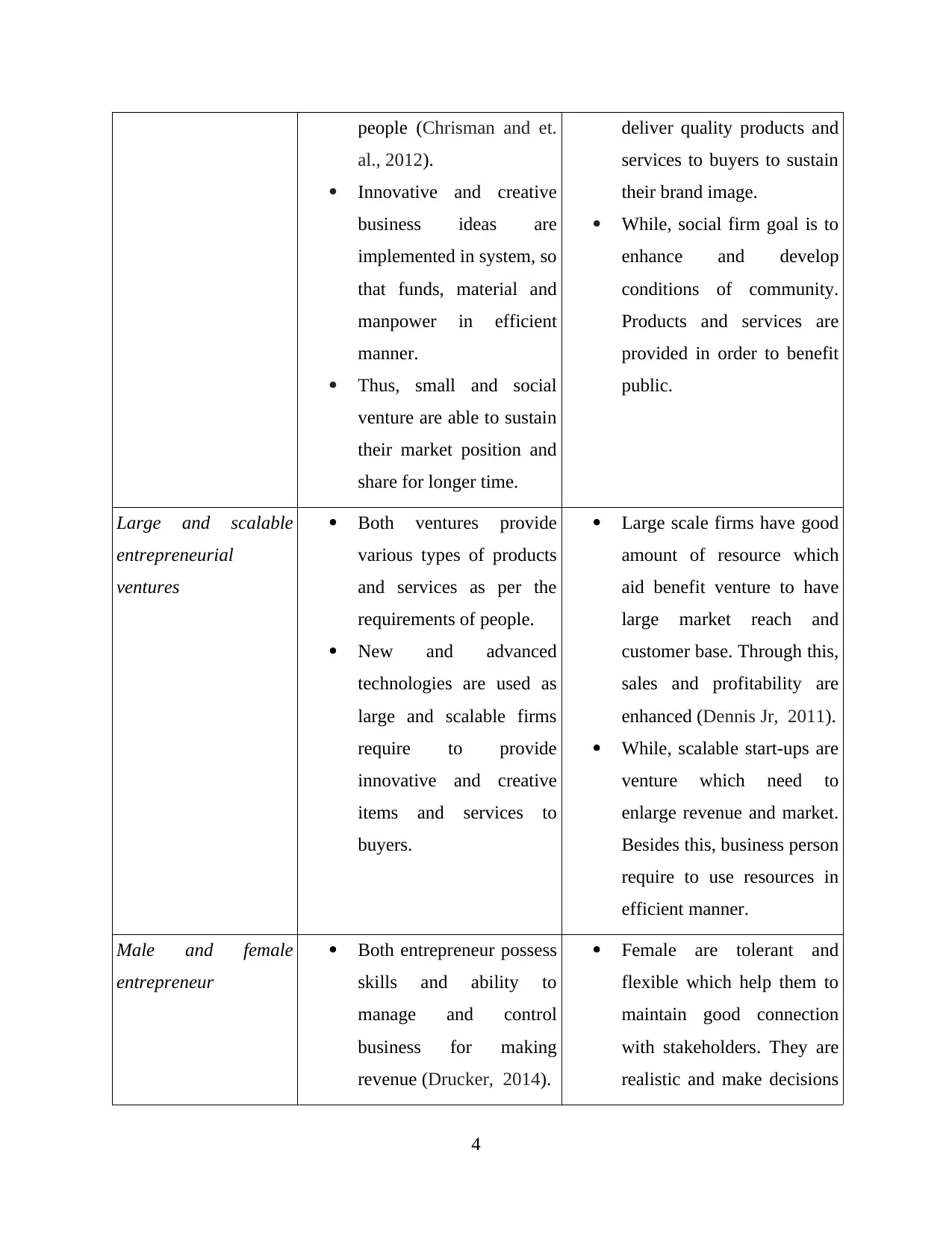
people (Chrisman and et.
al., 2012).
Innovative and creative
business ideas are
implemented in system, so
that funds, material and
manpower in efficient
manner.
Thus, small and social
venture are able to sustain
their market position and
share for longer time.
deliver quality products and
services to buyers to sustain
their brand image.
While, social firm goal is to
enhance and develop
conditions of community.
Products and services are
provided in order to benefit
public.
Large and scalable
entrepreneurial
ventures
Both ventures provide
various types of products
and services as per the
requirements of people.
New and advanced
technologies are used as
large and scalable firms
require to provide
innovative and creative
items and services to
buyers.
Large scale firms have good
amount of resource which
aid benefit venture to have
large market reach and
customer base. Through this,
sales and profitability are
enhanced (Dennis Jr, 2011).
While, scalable start-ups are
venture which need to
enlarge revenue and market.
Besides this, business person
require to use resources in
efficient manner.
Male and female
entrepreneur
Both entrepreneur possess
skills and ability to
manage and control
business for making
revenue (Drucker, 2014).
Female are tolerant and
flexible which help them to
maintain good connection
with stakeholders. They are
realistic and make decisions
4
al., 2012).
Innovative and creative
business ideas are
implemented in system, so
that funds, material and
manpower in efficient
manner.
Thus, small and social
venture are able to sustain
their market position and
share for longer time.
deliver quality products and
services to buyers to sustain
their brand image.
While, social firm goal is to
enhance and develop
conditions of community.
Products and services are
provided in order to benefit
public.
Large and scalable
entrepreneurial
ventures
Both ventures provide
various types of products
and services as per the
requirements of people.
New and advanced
technologies are used as
large and scalable firms
require to provide
innovative and creative
items and services to
buyers.
Large scale firms have good
amount of resource which
aid benefit venture to have
large market reach and
customer base. Through this,
sales and profitability are
enhanced (Dennis Jr, 2011).
While, scalable start-ups are
venture which need to
enlarge revenue and market.
Besides this, business person
require to use resources in
efficient manner.
Male and female
entrepreneur
Both entrepreneur possess
skills and ability to
manage and control
business for making
revenue (Drucker, 2014).
Female are tolerant and
flexible which help them to
maintain good connection
with stakeholders. They are
realistic and make decisions
4
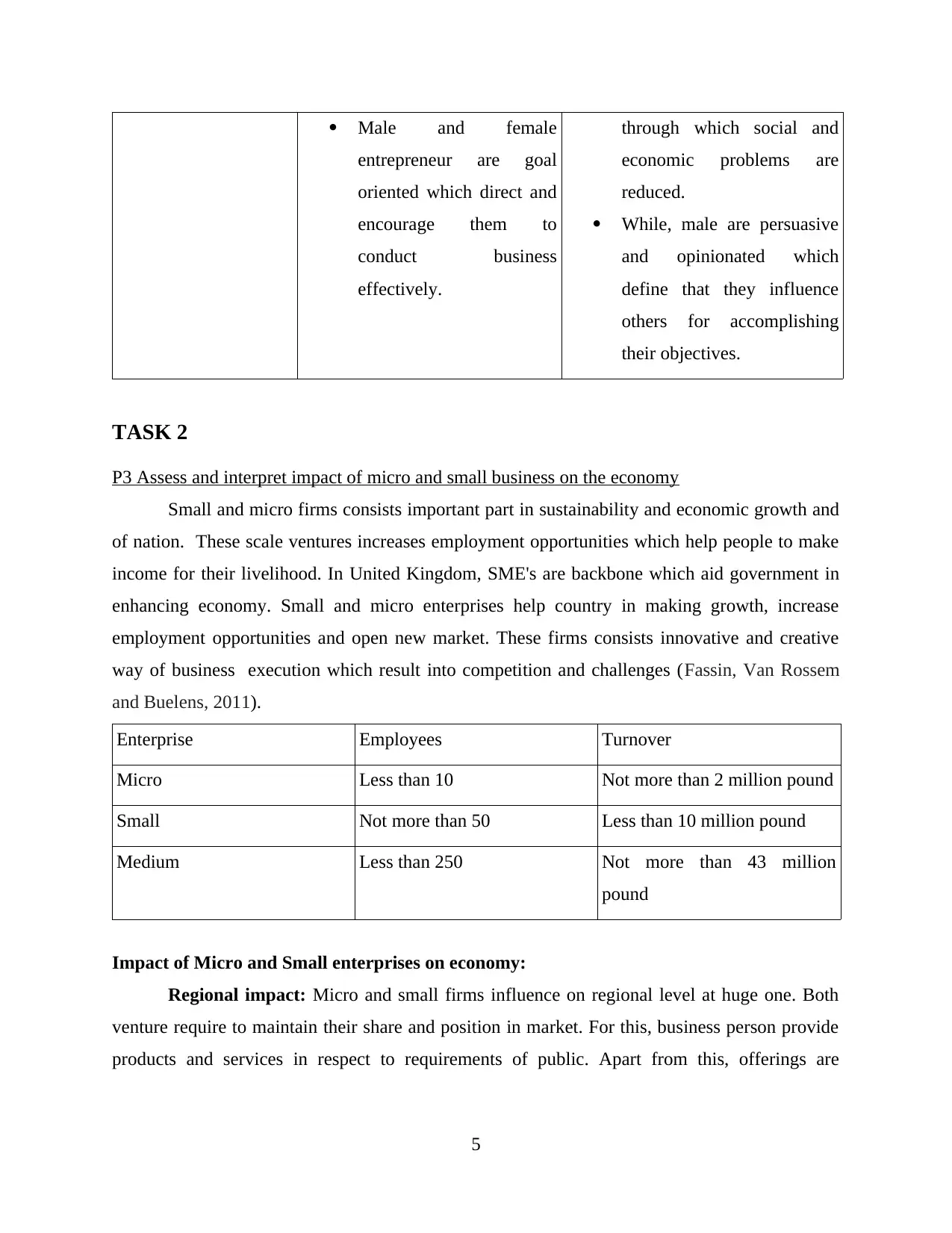
Male and female
entrepreneur are goal
oriented which direct and
encourage them to
conduct business
effectively.
through which social and
economic problems are
reduced.
While, male are persuasive
and opinionated which
define that they influence
others for accomplishing
their objectives.
TASK 2
P3 Assess and interpret impact of micro and small business on the economy
Small and micro firms consists important part in sustainability and economic growth and
of nation. These scale ventures increases employment opportunities which help people to make
income for their livelihood. In United Kingdom, SME's are backbone which aid government in
enhancing economy. Small and micro enterprises help country in making growth, increase
employment opportunities and open new market. These firms consists innovative and creative
way of business execution which result into competition and challenges (Fassin, Van Rossem
and Buelens, 2011).
Enterprise Employees Turnover
Micro Less than 10 Not more than 2 million pound
Small Not more than 50 Less than 10 million pound
Medium Less than 250 Not more than 43 million
pound
Impact of Micro and Small enterprises on economy:
Regional impact: Micro and small firms influence on regional level at huge one. Both
venture require to maintain their share and position in market. For this, business person provide
products and services in respect to requirements of public. Apart from this, offerings are
5
entrepreneur are goal
oriented which direct and
encourage them to
conduct business
effectively.
through which social and
economic problems are
reduced.
While, male are persuasive
and opinionated which
define that they influence
others for accomplishing
their objectives.
TASK 2
P3 Assess and interpret impact of micro and small business on the economy
Small and micro firms consists important part in sustainability and economic growth and
of nation. These scale ventures increases employment opportunities which help people to make
income for their livelihood. In United Kingdom, SME's are backbone which aid government in
enhancing economy. Small and micro enterprises help country in making growth, increase
employment opportunities and open new market. These firms consists innovative and creative
way of business execution which result into competition and challenges (Fassin, Van Rossem
and Buelens, 2011).
Enterprise Employees Turnover
Micro Less than 10 Not more than 2 million pound
Small Not more than 50 Less than 10 million pound
Medium Less than 250 Not more than 43 million
pound
Impact of Micro and Small enterprises on economy:
Regional impact: Micro and small firms influence on regional level at huge one. Both
venture require to maintain their share and position in market. For this, business person provide
products and services in respect to requirements of public. Apart from this, offerings are
5
Paraphrase This Document
Need a fresh take? Get an instant paraphrase of this document with our AI Paraphraser
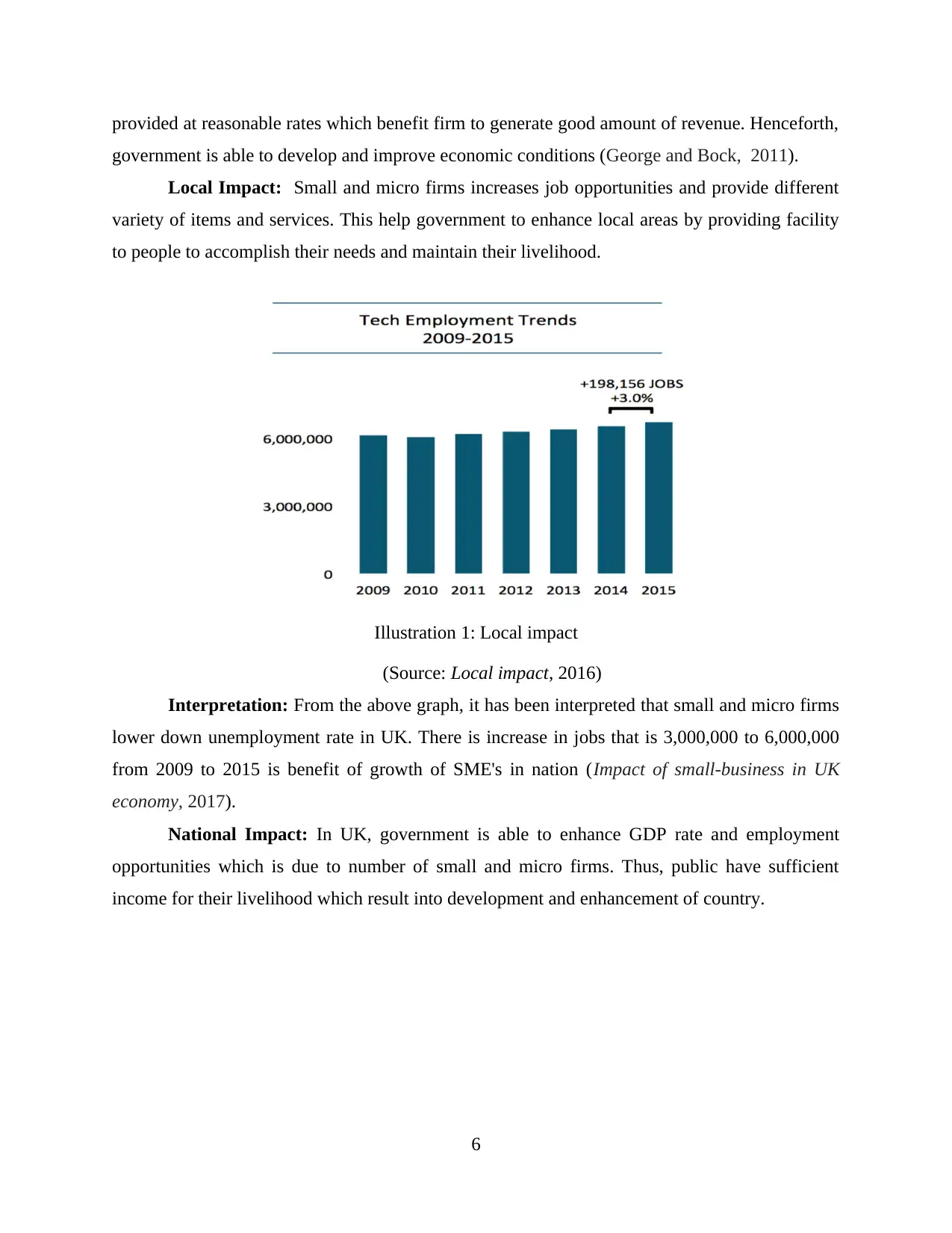
provided at reasonable rates which benefit firm to generate good amount of revenue. Henceforth,
government is able to develop and improve economic conditions (George and Bock, 2011).
Local Impact: Small and micro firms increases job opportunities and provide different
variety of items and services. This help government to enhance local areas by providing facility
to people to accomplish their needs and maintain their livelihood.
(Source: Local impact, 2016)
Interpretation: From the above graph, it has been interpreted that small and micro firms
lower down unemployment rate in UK. There is increase in jobs that is 3,000,000 to 6,000,000
from 2009 to 2015 is benefit of growth of SME's in nation (Impact of small-business in UK
economy, 2017).
National Impact: In UK, government is able to enhance GDP rate and employment
opportunities which is due to number of small and micro firms. Thus, public have sufficient
income for their livelihood which result into development and enhancement of country.
6
Illustration 1: Local impact
government is able to develop and improve economic conditions (George and Bock, 2011).
Local Impact: Small and micro firms increases job opportunities and provide different
variety of items and services. This help government to enhance local areas by providing facility
to people to accomplish their needs and maintain their livelihood.
(Source: Local impact, 2016)
Interpretation: From the above graph, it has been interpreted that small and micro firms
lower down unemployment rate in UK. There is increase in jobs that is 3,000,000 to 6,000,000
from 2009 to 2015 is benefit of growth of SME's in nation (Impact of small-business in UK
economy, 2017).
National Impact: In UK, government is able to enhance GDP rate and employment
opportunities which is due to number of small and micro firms. Thus, public have sufficient
income for their livelihood which result into development and enhancement of country.
6
Illustration 1: Local impact
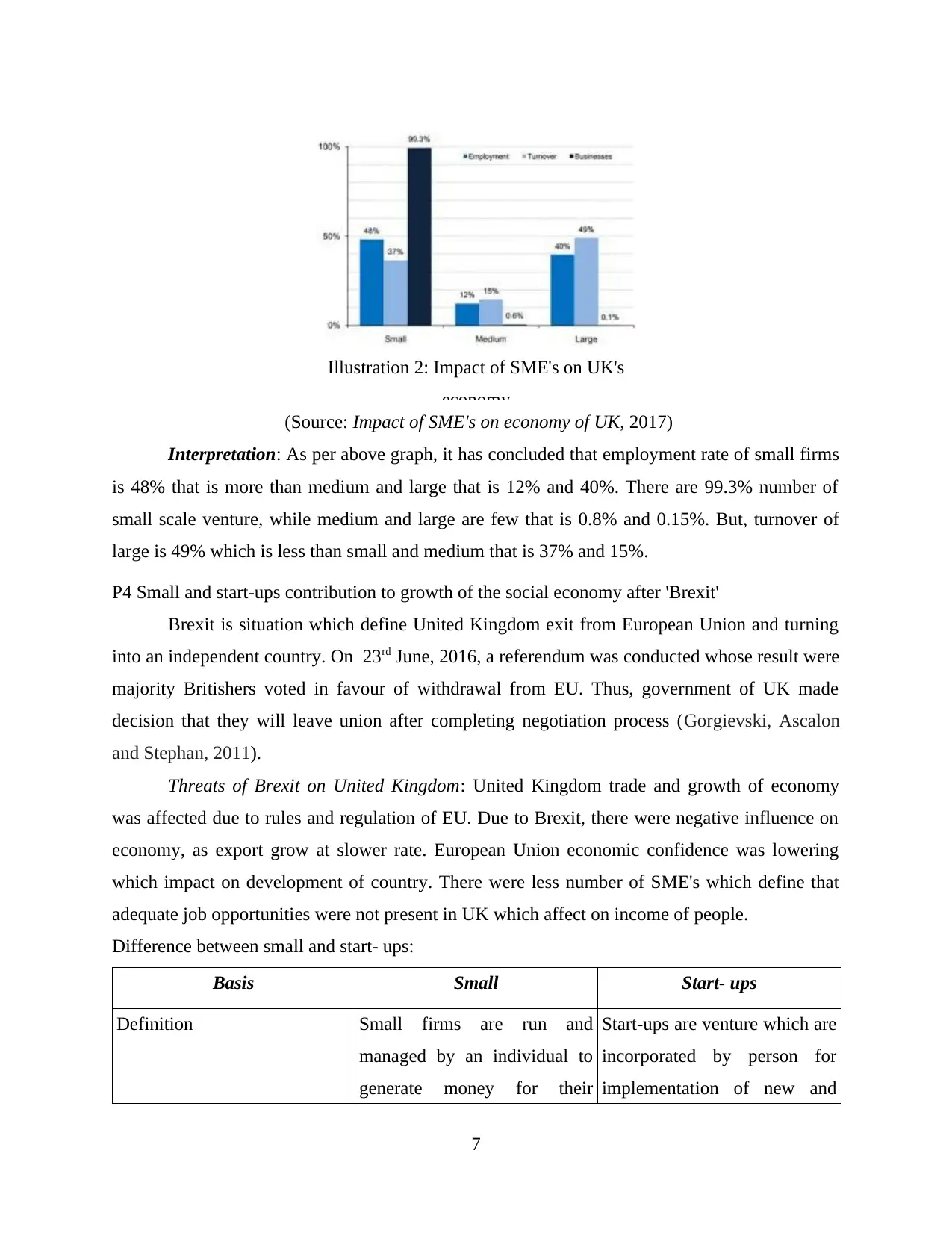
(Source: Impact of SME's on economy of UK, 2017)
Interpretation: As per above graph, it has concluded that employment rate of small firms
is 48% that is more than medium and large that is 12% and 40%. There are 99.3% number of
small scale venture, while medium and large are few that is 0.8% and 0.15%. But, turnover of
large is 49% which is less than small and medium that is 37% and 15%.
P4 Small and start-ups contribution to growth of the social economy after 'Brexit'
Brexit is situation which define United Kingdom exit from European Union and turning
into an independent country. On 23rd June, 2016, a referendum was conducted whose result were
majority Britishers voted in favour of withdrawal from EU. Thus, government of UK made
decision that they will leave union after completing negotiation process (Gorgievski, Ascalon
and Stephan, 2011).
Threats of Brexit on United Kingdom: United Kingdom trade and growth of economy
was affected due to rules and regulation of EU. Due to Brexit, there were negative influence on
economy, as export grow at slower rate. European Union economic confidence was lowering
which impact on development of country. There were less number of SME's which define that
adequate job opportunities were not present in UK which affect on income of people.
Difference between small and start- ups:
Basis Small Start- ups
Definition Small firms are run and
managed by an individual to
generate money for their
Start-ups are venture which are
incorporated by person for
implementation of new and
7
Illustration 2: Impact of SME's on UK's
economy
Interpretation: As per above graph, it has concluded that employment rate of small firms
is 48% that is more than medium and large that is 12% and 40%. There are 99.3% number of
small scale venture, while medium and large are few that is 0.8% and 0.15%. But, turnover of
large is 49% which is less than small and medium that is 37% and 15%.
P4 Small and start-ups contribution to growth of the social economy after 'Brexit'
Brexit is situation which define United Kingdom exit from European Union and turning
into an independent country. On 23rd June, 2016, a referendum was conducted whose result were
majority Britishers voted in favour of withdrawal from EU. Thus, government of UK made
decision that they will leave union after completing negotiation process (Gorgievski, Ascalon
and Stephan, 2011).
Threats of Brexit on United Kingdom: United Kingdom trade and growth of economy
was affected due to rules and regulation of EU. Due to Brexit, there were negative influence on
economy, as export grow at slower rate. European Union economic confidence was lowering
which impact on development of country. There were less number of SME's which define that
adequate job opportunities were not present in UK which affect on income of people.
Difference between small and start- ups:
Basis Small Start- ups
Definition Small firms are run and
managed by an individual to
generate money for their
Start-ups are venture which are
incorporated by person for
implementation of new and
7
Illustration 2: Impact of SME's on UK's
economy
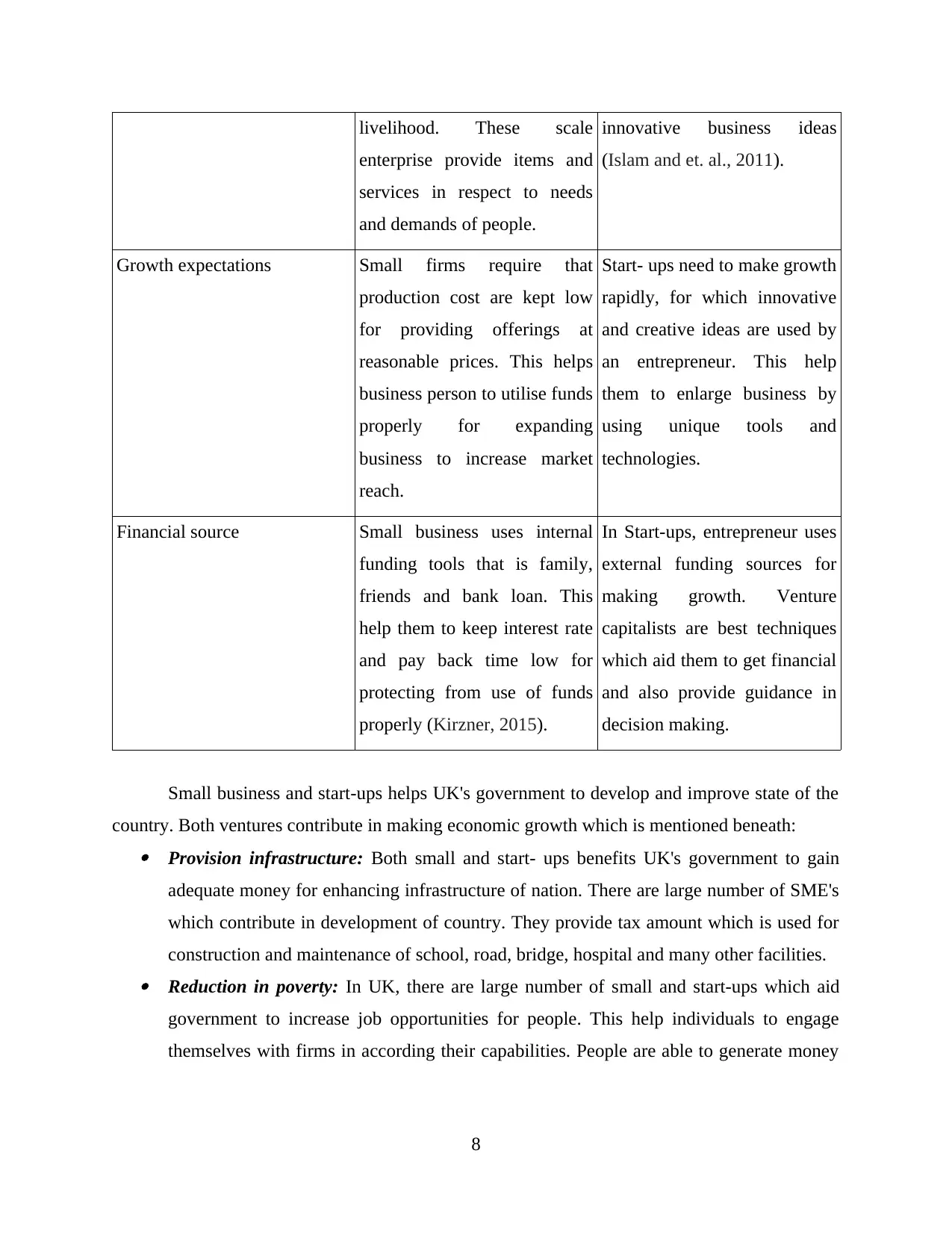
livelihood. These scale
enterprise provide items and
services in respect to needs
and demands of people.
innovative business ideas
(Islam and et. al., 2011).
Growth expectations Small firms require that
production cost are kept low
for providing offerings at
reasonable prices. This helps
business person to utilise funds
properly for expanding
business to increase market
reach.
Start- ups need to make growth
rapidly, for which innovative
and creative ideas are used by
an entrepreneur. This help
them to enlarge business by
using unique tools and
technologies.
Financial source Small business uses internal
funding tools that is family,
friends and bank loan. This
help them to keep interest rate
and pay back time low for
protecting from use of funds
properly (Kirzner, 2015).
In Start-ups, entrepreneur uses
external funding sources for
making growth. Venture
capitalists are best techniques
which aid them to get financial
and also provide guidance in
decision making.
Small business and start-ups helps UK's government to develop and improve state of the
country. Both ventures contribute in making economic growth which is mentioned beneath: Provision infrastructure: Both small and start- ups benefits UK's government to gain
adequate money for enhancing infrastructure of nation. There are large number of SME's
which contribute in development of country. They provide tax amount which is used for
construction and maintenance of school, road, bridge, hospital and many other facilities. Reduction in poverty: In UK, there are large number of small and start-ups which aid
government to increase job opportunities for people. This help individuals to engage
themselves with firms in according their capabilities. People are able to generate money
8
enterprise provide items and
services in respect to needs
and demands of people.
innovative business ideas
(Islam and et. al., 2011).
Growth expectations Small firms require that
production cost are kept low
for providing offerings at
reasonable prices. This helps
business person to utilise funds
properly for expanding
business to increase market
reach.
Start- ups need to make growth
rapidly, for which innovative
and creative ideas are used by
an entrepreneur. This help
them to enlarge business by
using unique tools and
technologies.
Financial source Small business uses internal
funding tools that is family,
friends and bank loan. This
help them to keep interest rate
and pay back time low for
protecting from use of funds
properly (Kirzner, 2015).
In Start-ups, entrepreneur uses
external funding sources for
making growth. Venture
capitalists are best techniques
which aid them to get financial
and also provide guidance in
decision making.
Small business and start-ups helps UK's government to develop and improve state of the
country. Both ventures contribute in making economic growth which is mentioned beneath: Provision infrastructure: Both small and start- ups benefits UK's government to gain
adequate money for enhancing infrastructure of nation. There are large number of SME's
which contribute in development of country. They provide tax amount which is used for
construction and maintenance of school, road, bridge, hospital and many other facilities. Reduction in poverty: In UK, there are large number of small and start-ups which aid
government to increase job opportunities for people. This help individuals to engage
themselves with firms in according their capabilities. People are able to generate money
8
Secure Best Marks with AI Grader
Need help grading? Try our AI Grader for instant feedback on your assignments.
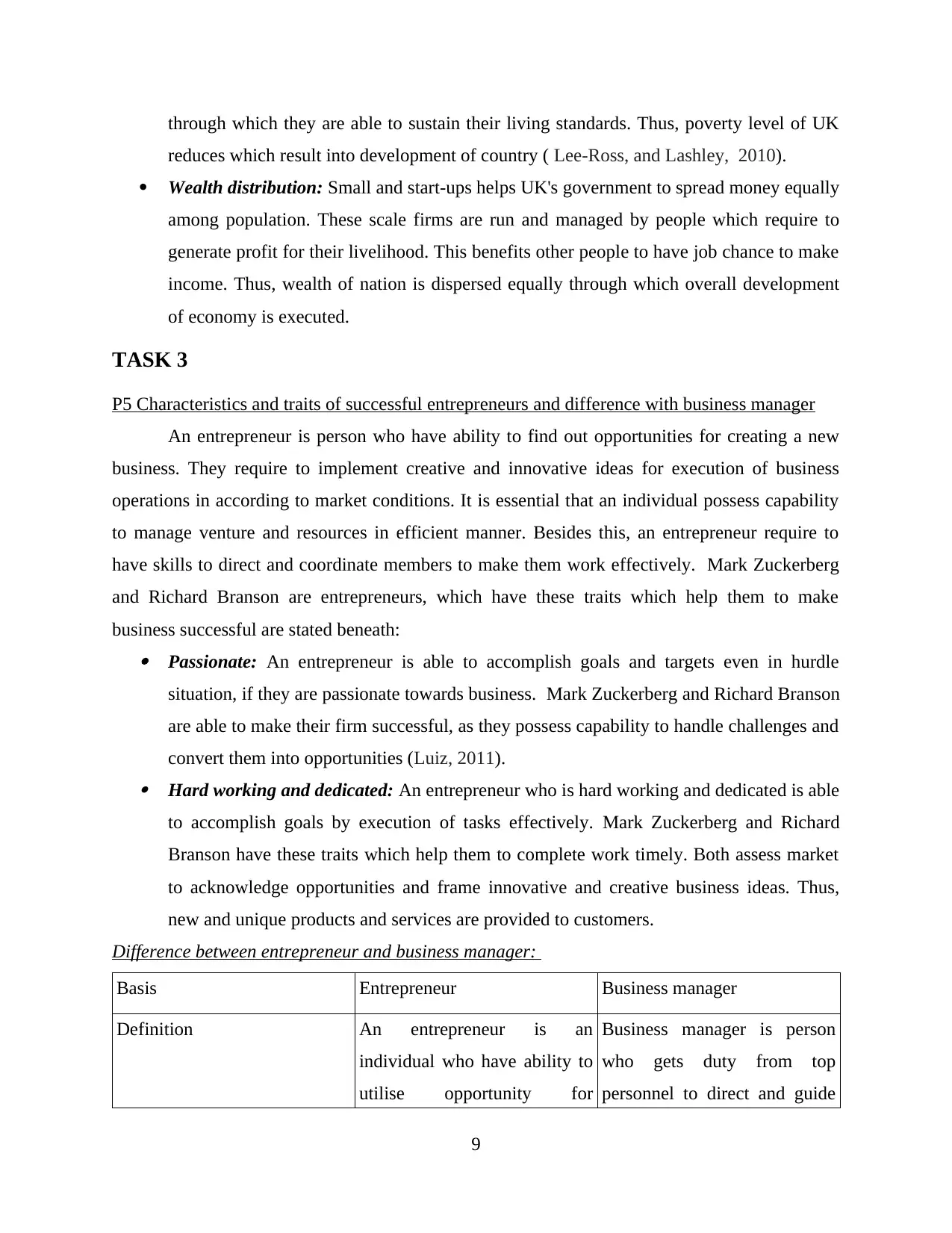
through which they are able to sustain their living standards. Thus, poverty level of UK
reduces which result into development of country ( Lee-Ross, and Lashley, 2010).
Wealth distribution: Small and start-ups helps UK's government to spread money equally
among population. These scale firms are run and managed by people which require to
generate profit for their livelihood. This benefits other people to have job chance to make
income. Thus, wealth of nation is dispersed equally through which overall development
of economy is executed.
TASK 3
P5 Characteristics and traits of successful entrepreneurs and difference with business manager
An entrepreneur is person who have ability to find out opportunities for creating a new
business. They require to implement creative and innovative ideas for execution of business
operations in according to market conditions. It is essential that an individual possess capability
to manage venture and resources in efficient manner. Besides this, an entrepreneur require to
have skills to direct and coordinate members to make them work effectively. Mark Zuckerberg
and Richard Branson are entrepreneurs, which have these traits which help them to make
business successful are stated beneath: Passionate: An entrepreneur is able to accomplish goals and targets even in hurdle
situation, if they are passionate towards business. Mark Zuckerberg and Richard Branson
are able to make their firm successful, as they possess capability to handle challenges and
convert them into opportunities (Luiz, 2011). Hard working and dedicated: An entrepreneur who is hard working and dedicated is able
to accomplish goals by execution of tasks effectively. Mark Zuckerberg and Richard
Branson have these traits which help them to complete work timely. Both assess market
to acknowledge opportunities and frame innovative and creative business ideas. Thus,
new and unique products and services are provided to customers.
Difference between entrepreneur and business manager:
Basis Entrepreneur Business manager
Definition An entrepreneur is an
individual who have ability to
utilise opportunity for
Business manager is person
who gets duty from top
personnel to direct and guide
9
reduces which result into development of country ( Lee-Ross, and Lashley, 2010).
Wealth distribution: Small and start-ups helps UK's government to spread money equally
among population. These scale firms are run and managed by people which require to
generate profit for their livelihood. This benefits other people to have job chance to make
income. Thus, wealth of nation is dispersed equally through which overall development
of economy is executed.
TASK 3
P5 Characteristics and traits of successful entrepreneurs and difference with business manager
An entrepreneur is person who have ability to find out opportunities for creating a new
business. They require to implement creative and innovative ideas for execution of business
operations in according to market conditions. It is essential that an individual possess capability
to manage venture and resources in efficient manner. Besides this, an entrepreneur require to
have skills to direct and coordinate members to make them work effectively. Mark Zuckerberg
and Richard Branson are entrepreneurs, which have these traits which help them to make
business successful are stated beneath: Passionate: An entrepreneur is able to accomplish goals and targets even in hurdle
situation, if they are passionate towards business. Mark Zuckerberg and Richard Branson
are able to make their firm successful, as they possess capability to handle challenges and
convert them into opportunities (Luiz, 2011). Hard working and dedicated: An entrepreneur who is hard working and dedicated is able
to accomplish goals by execution of tasks effectively. Mark Zuckerberg and Richard
Branson have these traits which help them to complete work timely. Both assess market
to acknowledge opportunities and frame innovative and creative business ideas. Thus,
new and unique products and services are provided to customers.
Difference between entrepreneur and business manager:
Basis Entrepreneur Business manager
Definition An entrepreneur is an
individual who have ability to
utilise opportunity for
Business manager is person
who gets duty from top
personnel to direct and guide
9
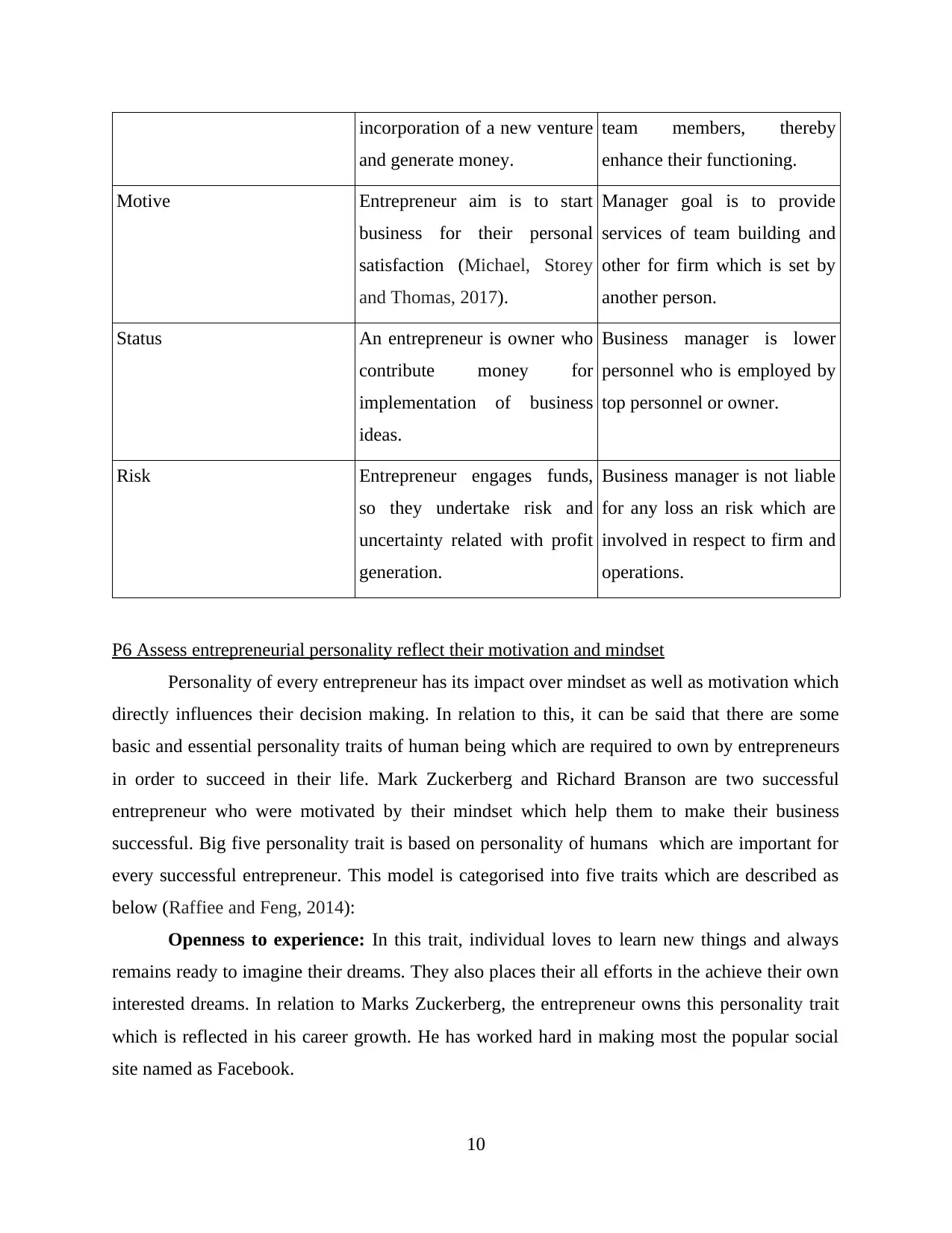
incorporation of a new venture
and generate money.
team members, thereby
enhance their functioning.
Motive Entrepreneur aim is to start
business for their personal
satisfaction (Michael, Storey
and Thomas, 2017).
Manager goal is to provide
services of team building and
other for firm which is set by
another person.
Status An entrepreneur is owner who
contribute money for
implementation of business
ideas.
Business manager is lower
personnel who is employed by
top personnel or owner.
Risk Entrepreneur engages funds,
so they undertake risk and
uncertainty related with profit
generation.
Business manager is not liable
for any loss an risk which are
involved in respect to firm and
operations.
P6 Assess entrepreneurial personality reflect their motivation and mindset
Personality of every entrepreneur has its impact over mindset as well as motivation which
directly influences their decision making. In relation to this, it can be said that there are some
basic and essential personality traits of human being which are required to own by entrepreneurs
in order to succeed in their life. Mark Zuckerberg and Richard Branson are two successful
entrepreneur who were motivated by their mindset which help them to make their business
successful. Big five personality trait is based on personality of humans which are important for
every successful entrepreneur. This model is categorised into five traits which are described as
below (Raffiee and Feng, 2014):
Openness to experience: In this trait, individual loves to learn new things and always
remains ready to imagine their dreams. They also places their all efforts in the achieve their own
interested dreams. In relation to Marks Zuckerberg, the entrepreneur owns this personality trait
which is reflected in his career growth. He has worked hard in making most the popular social
site named as Facebook.
10
and generate money.
team members, thereby
enhance their functioning.
Motive Entrepreneur aim is to start
business for their personal
satisfaction (Michael, Storey
and Thomas, 2017).
Manager goal is to provide
services of team building and
other for firm which is set by
another person.
Status An entrepreneur is owner who
contribute money for
implementation of business
ideas.
Business manager is lower
personnel who is employed by
top personnel or owner.
Risk Entrepreneur engages funds,
so they undertake risk and
uncertainty related with profit
generation.
Business manager is not liable
for any loss an risk which are
involved in respect to firm and
operations.
P6 Assess entrepreneurial personality reflect their motivation and mindset
Personality of every entrepreneur has its impact over mindset as well as motivation which
directly influences their decision making. In relation to this, it can be said that there are some
basic and essential personality traits of human being which are required to own by entrepreneurs
in order to succeed in their life. Mark Zuckerberg and Richard Branson are two successful
entrepreneur who were motivated by their mindset which help them to make their business
successful. Big five personality trait is based on personality of humans which are important for
every successful entrepreneur. This model is categorised into five traits which are described as
below (Raffiee and Feng, 2014):
Openness to experience: In this trait, individual loves to learn new things and always
remains ready to imagine their dreams. They also places their all efforts in the achieve their own
interested dreams. In relation to Marks Zuckerberg, the entrepreneur owns this personality trait
which is reflected in his career growth. He has worked hard in making most the popular social
site named as Facebook.
10
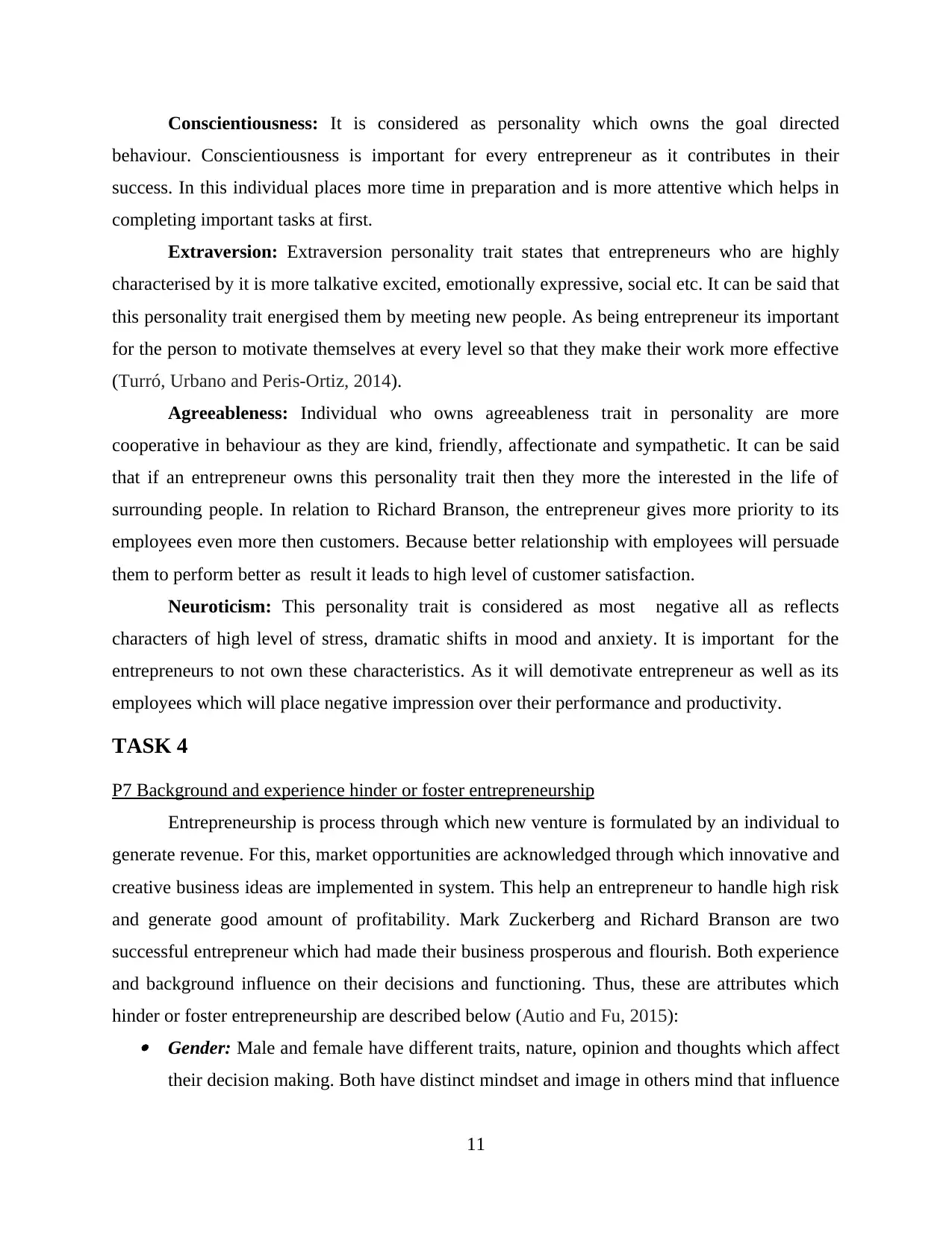
Conscientiousness: It is considered as personality which owns the goal directed
behaviour. Conscientiousness is important for every entrepreneur as it contributes in their
success. In this individual places more time in preparation and is more attentive which helps in
completing important tasks at first.
Extraversion: Extraversion personality trait states that entrepreneurs who are highly
characterised by it is more talkative excited, emotionally expressive, social etc. It can be said that
this personality trait energised them by meeting new people. As being entrepreneur its important
for the person to motivate themselves at every level so that they make their work more effective
(Turró, Urbano and Peris-Ortiz, 2014).
Agreeableness: Individual who owns agreeableness trait in personality are more
cooperative in behaviour as they are kind, friendly, affectionate and sympathetic. It can be said
that if an entrepreneur owns this personality trait then they more the interested in the life of
surrounding people. In relation to Richard Branson, the entrepreneur gives more priority to its
employees even more then customers. Because better relationship with employees will persuade
them to perform better as result it leads to high level of customer satisfaction.
Neuroticism: This personality trait is considered as most negative all as reflects
characters of high level of stress, dramatic shifts in mood and anxiety. It is important for the
entrepreneurs to not own these characteristics. As it will demotivate entrepreneur as well as its
employees which will place negative impression over their performance and productivity.
TASK 4
P7 Background and experience hinder or foster entrepreneurship
Entrepreneurship is process through which new venture is formulated by an individual to
generate revenue. For this, market opportunities are acknowledged through which innovative and
creative business ideas are implemented in system. This help an entrepreneur to handle high risk
and generate good amount of profitability. Mark Zuckerberg and Richard Branson are two
successful entrepreneur which had made their business prosperous and flourish. Both experience
and background influence on their decisions and functioning. Thus, these are attributes which
hinder or foster entrepreneurship are described below (Autio and Fu, 2015): Gender: Male and female have different traits, nature, opinion and thoughts which affect
their decision making. Both have distinct mindset and image in others mind that influence
11
behaviour. Conscientiousness is important for every entrepreneur as it contributes in their
success. In this individual places more time in preparation and is more attentive which helps in
completing important tasks at first.
Extraversion: Extraversion personality trait states that entrepreneurs who are highly
characterised by it is more talkative excited, emotionally expressive, social etc. It can be said that
this personality trait energised them by meeting new people. As being entrepreneur its important
for the person to motivate themselves at every level so that they make their work more effective
(Turró, Urbano and Peris-Ortiz, 2014).
Agreeableness: Individual who owns agreeableness trait in personality are more
cooperative in behaviour as they are kind, friendly, affectionate and sympathetic. It can be said
that if an entrepreneur owns this personality trait then they more the interested in the life of
surrounding people. In relation to Richard Branson, the entrepreneur gives more priority to its
employees even more then customers. Because better relationship with employees will persuade
them to perform better as result it leads to high level of customer satisfaction.
Neuroticism: This personality trait is considered as most negative all as reflects
characters of high level of stress, dramatic shifts in mood and anxiety. It is important for the
entrepreneurs to not own these characteristics. As it will demotivate entrepreneur as well as its
employees which will place negative impression over their performance and productivity.
TASK 4
P7 Background and experience hinder or foster entrepreneurship
Entrepreneurship is process through which new venture is formulated by an individual to
generate revenue. For this, market opportunities are acknowledged through which innovative and
creative business ideas are implemented in system. This help an entrepreneur to handle high risk
and generate good amount of profitability. Mark Zuckerberg and Richard Branson are two
successful entrepreneur which had made their business prosperous and flourish. Both experience
and background influence on their decisions and functioning. Thus, these are attributes which
hinder or foster entrepreneurship are described below (Autio and Fu, 2015): Gender: Male and female have different traits, nature, opinion and thoughts which affect
their decision making. Both have distinct mindset and image in others mind that influence
11
Paraphrase This Document
Need a fresh take? Get an instant paraphrase of this document with our AI Paraphraser
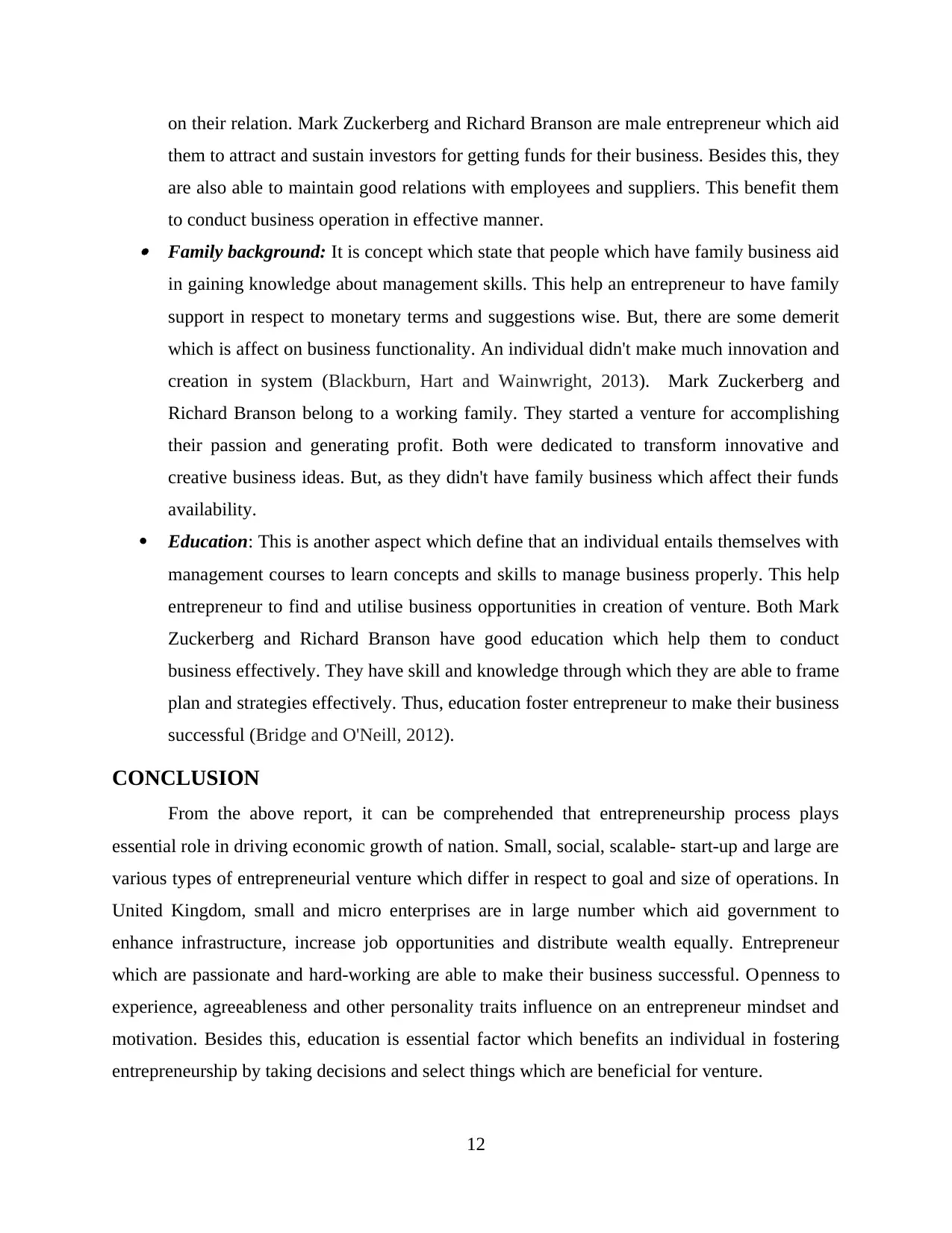
on their relation. Mark Zuckerberg and Richard Branson are male entrepreneur which aid
them to attract and sustain investors for getting funds for their business. Besides this, they
are also able to maintain good relations with employees and suppliers. This benefit them
to conduct business operation in effective manner. Family background: It is concept which state that people which have family business aid
in gaining knowledge about management skills. This help an entrepreneur to have family
support in respect to monetary terms and suggestions wise. But, there are some demerit
which is affect on business functionality. An individual didn't make much innovation and
creation in system (Blackburn, Hart and Wainwright, 2013). Mark Zuckerberg and
Richard Branson belong to a working family. They started a venture for accomplishing
their passion and generating profit. Both were dedicated to transform innovative and
creative business ideas. But, as they didn't have family business which affect their funds
availability.
Education: This is another aspect which define that an individual entails themselves with
management courses to learn concepts and skills to manage business properly. This help
entrepreneur to find and utilise business opportunities in creation of venture. Both Mark
Zuckerberg and Richard Branson have good education which help them to conduct
business effectively. They have skill and knowledge through which they are able to frame
plan and strategies effectively. Thus, education foster entrepreneur to make their business
successful (Bridge and O'Neill, 2012).
CONCLUSION
From the above report, it can be comprehended that entrepreneurship process plays
essential role in driving economic growth of nation. Small, social, scalable- start-up and large are
various types of entrepreneurial venture which differ in respect to goal and size of operations. In
United Kingdom, small and micro enterprises are in large number which aid government to
enhance infrastructure, increase job opportunities and distribute wealth equally. Entrepreneur
which are passionate and hard-working are able to make their business successful. Openness to
experience, agreeableness and other personality traits influence on an entrepreneur mindset and
motivation. Besides this, education is essential factor which benefits an individual in fostering
entrepreneurship by taking decisions and select things which are beneficial for venture.
12
them to attract and sustain investors for getting funds for their business. Besides this, they
are also able to maintain good relations with employees and suppliers. This benefit them
to conduct business operation in effective manner. Family background: It is concept which state that people which have family business aid
in gaining knowledge about management skills. This help an entrepreneur to have family
support in respect to monetary terms and suggestions wise. But, there are some demerit
which is affect on business functionality. An individual didn't make much innovation and
creation in system (Blackburn, Hart and Wainwright, 2013). Mark Zuckerberg and
Richard Branson belong to a working family. They started a venture for accomplishing
their passion and generating profit. Both were dedicated to transform innovative and
creative business ideas. But, as they didn't have family business which affect their funds
availability.
Education: This is another aspect which define that an individual entails themselves with
management courses to learn concepts and skills to manage business properly. This help
entrepreneur to find and utilise business opportunities in creation of venture. Both Mark
Zuckerberg and Richard Branson have good education which help them to conduct
business effectively. They have skill and knowledge through which they are able to frame
plan and strategies effectively. Thus, education foster entrepreneur to make their business
successful (Bridge and O'Neill, 2012).
CONCLUSION
From the above report, it can be comprehended that entrepreneurship process plays
essential role in driving economic growth of nation. Small, social, scalable- start-up and large are
various types of entrepreneurial venture which differ in respect to goal and size of operations. In
United Kingdom, small and micro enterprises are in large number which aid government to
enhance infrastructure, increase job opportunities and distribute wealth equally. Entrepreneur
which are passionate and hard-working are able to make their business successful. Openness to
experience, agreeableness and other personality traits influence on an entrepreneur mindset and
motivation. Besides this, education is essential factor which benefits an individual in fostering
entrepreneurship by taking decisions and select things which are beneficial for venture.
12
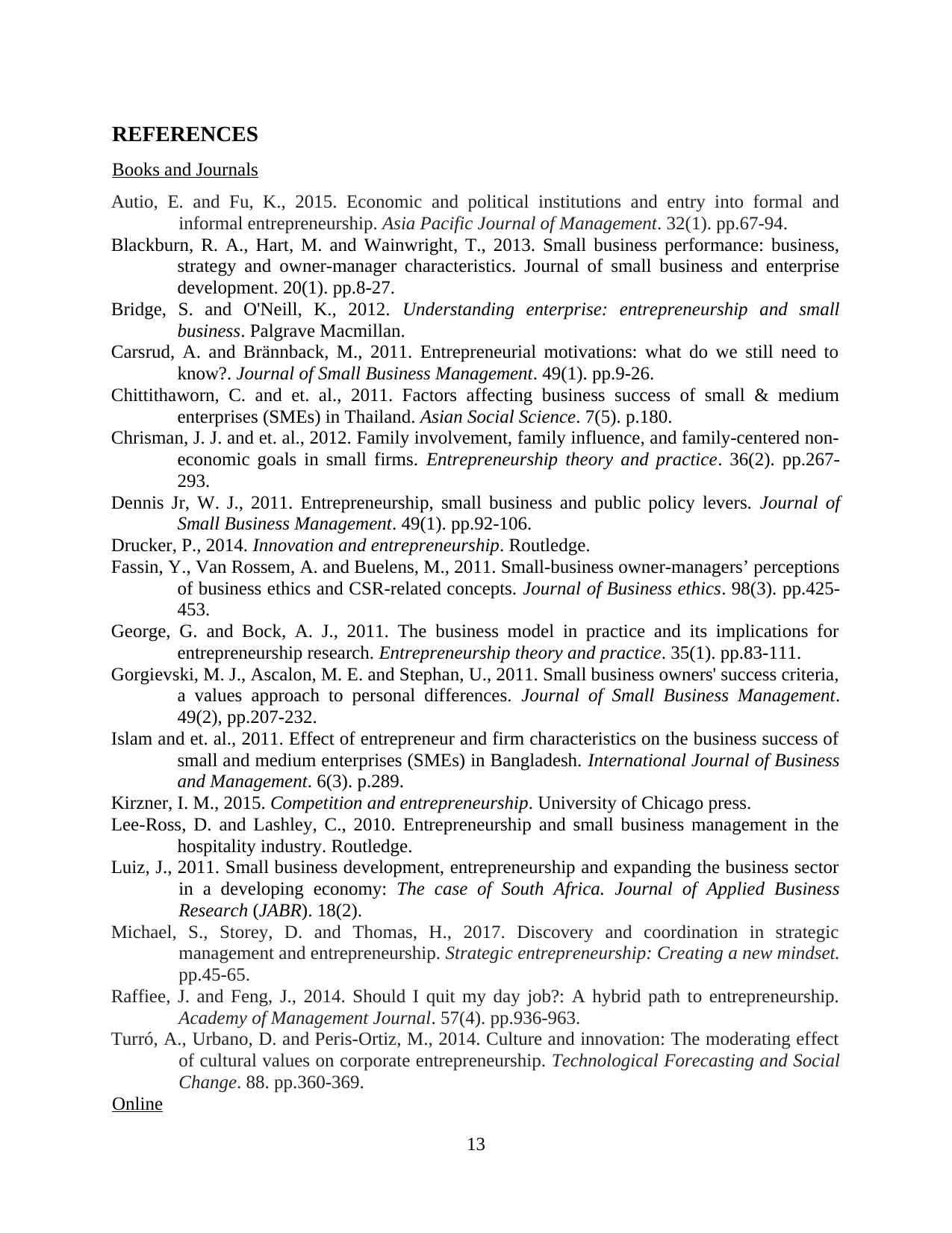
REFERENCES
Books and Journals
Autio, E. and Fu, K., 2015. Economic and political institutions and entry into formal and
informal entrepreneurship. Asia Pacific Journal of Management. 32(1). pp.67-94.
Blackburn, R. A., Hart, M. and Wainwright, T., 2013. Small business performance: business,
strategy and owner-manager characteristics. Journal of small business and enterprise
development. 20(1). pp.8-27.
Bridge, S. and O'Neill, K., 2012. Understanding enterprise: entrepreneurship and small
business. Palgrave Macmillan.
Carsrud, A. and Brännback, M., 2011. Entrepreneurial motivations: what do we still need to
know?. Journal of Small Business Management. 49(1). pp.9-26.
Chittithaworn, C. and et. al., 2011. Factors affecting business success of small & medium
enterprises (SMEs) in Thailand. Asian Social Science. 7(5). p.180.
Chrisman, J. J. and et. al., 2012. Family involvement, family influence, and family‐centered non‐
economic goals in small firms. Entrepreneurship theory and practice. 36(2). pp.267-
293.
Dennis Jr, W. J., 2011. Entrepreneurship, small business and public policy levers. Journal of
Small Business Management. 49(1). pp.92-106.
Drucker, P., 2014. Innovation and entrepreneurship. Routledge.
Fassin, Y., Van Rossem, A. and Buelens, M., 2011. Small-business owner-managers’ perceptions
of business ethics and CSR-related concepts. Journal of Business ethics. 98(3). pp.425-
453.
George, G. and Bock, A. J., 2011. The business model in practice and its implications for
entrepreneurship research. Entrepreneurship theory and practice. 35(1). pp.83-111.
Gorgievski, M. J., Ascalon, M. E. and Stephan, U., 2011. Small business owners' success criteria,
a values approach to personal differences. Journal of Small Business Management.
49(2), pp.207-232.
Islam and et. al., 2011. Effect of entrepreneur and firm characteristics on the business success of
small and medium enterprises (SMEs) in Bangladesh. International Journal of Business
and Management. 6(3). p.289.
Kirzner, I. M., 2015. Competition and entrepreneurship. University of Chicago press.
Lee-Ross, D. and Lashley, C., 2010. Entrepreneurship and small business management in the
hospitality industry. Routledge.
Luiz, J., 2011. Small business development, entrepreneurship and expanding the business sector
in a developing economy: The case of South Africa. Journal of Applied Business
Research (JABR). 18(2).
Michael, S., Storey, D. and Thomas, H., 2017. Discovery and coordination in strategic
management and entrepreneurship. Strategic entrepreneurship: Creating a new mindset.
pp.45-65.
Raffiee, J. and Feng, J., 2014. Should I quit my day job?: A hybrid path to entrepreneurship.
Academy of Management Journal. 57(4). pp.936-963.
Turró, A., Urbano, D. and Peris-Ortiz, M., 2014. Culture and innovation: The moderating effect
of cultural values on corporate entrepreneurship. Technological Forecasting and Social
Change. 88. pp.360-369.
Online
13
Books and Journals
Autio, E. and Fu, K., 2015. Economic and political institutions and entry into formal and
informal entrepreneurship. Asia Pacific Journal of Management. 32(1). pp.67-94.
Blackburn, R. A., Hart, M. and Wainwright, T., 2013. Small business performance: business,
strategy and owner-manager characteristics. Journal of small business and enterprise
development. 20(1). pp.8-27.
Bridge, S. and O'Neill, K., 2012. Understanding enterprise: entrepreneurship and small
business. Palgrave Macmillan.
Carsrud, A. and Brännback, M., 2011. Entrepreneurial motivations: what do we still need to
know?. Journal of Small Business Management. 49(1). pp.9-26.
Chittithaworn, C. and et. al., 2011. Factors affecting business success of small & medium
enterprises (SMEs) in Thailand. Asian Social Science. 7(5). p.180.
Chrisman, J. J. and et. al., 2012. Family involvement, family influence, and family‐centered non‐
economic goals in small firms. Entrepreneurship theory and practice. 36(2). pp.267-
293.
Dennis Jr, W. J., 2011. Entrepreneurship, small business and public policy levers. Journal of
Small Business Management. 49(1). pp.92-106.
Drucker, P., 2014. Innovation and entrepreneurship. Routledge.
Fassin, Y., Van Rossem, A. and Buelens, M., 2011. Small-business owner-managers’ perceptions
of business ethics and CSR-related concepts. Journal of Business ethics. 98(3). pp.425-
453.
George, G. and Bock, A. J., 2011. The business model in practice and its implications for
entrepreneurship research. Entrepreneurship theory and practice. 35(1). pp.83-111.
Gorgievski, M. J., Ascalon, M. E. and Stephan, U., 2011. Small business owners' success criteria,
a values approach to personal differences. Journal of Small Business Management.
49(2), pp.207-232.
Islam and et. al., 2011. Effect of entrepreneur and firm characteristics on the business success of
small and medium enterprises (SMEs) in Bangladesh. International Journal of Business
and Management. 6(3). p.289.
Kirzner, I. M., 2015. Competition and entrepreneurship. University of Chicago press.
Lee-Ross, D. and Lashley, C., 2010. Entrepreneurship and small business management in the
hospitality industry. Routledge.
Luiz, J., 2011. Small business development, entrepreneurship and expanding the business sector
in a developing economy: The case of South Africa. Journal of Applied Business
Research (JABR). 18(2).
Michael, S., Storey, D. and Thomas, H., 2017. Discovery and coordination in strategic
management and entrepreneurship. Strategic entrepreneurship: Creating a new mindset.
pp.45-65.
Raffiee, J. and Feng, J., 2014. Should I quit my day job?: A hybrid path to entrepreneurship.
Academy of Management Journal. 57(4). pp.936-963.
Turró, A., Urbano, D. and Peris-Ortiz, M., 2014. Culture and innovation: The moderating effect
of cultural values on corporate entrepreneurship. Technological Forecasting and Social
Change. 88. pp.360-369.
Online
13

Impact of small-business in UK economy. 2017. [Online]. Available through:
<http://smallbusiness.chron.com/important-small-businesses-local-economies-
5251.html>.
14
<http://smallbusiness.chron.com/important-small-businesses-local-economies-
5251.html>.
14
1 out of 16
Related Documents
Your All-in-One AI-Powered Toolkit for Academic Success.
+13062052269
info@desklib.com
Available 24*7 on WhatsApp / Email
![[object Object]](/_next/static/media/star-bottom.7253800d.svg)
Unlock your academic potential
© 2024 | Zucol Services PVT LTD | All rights reserved.





